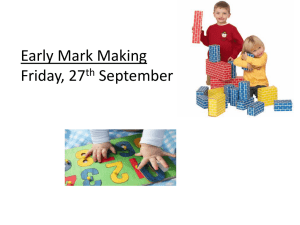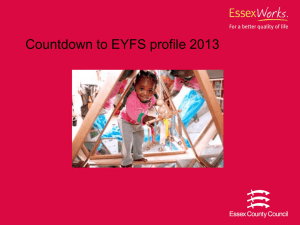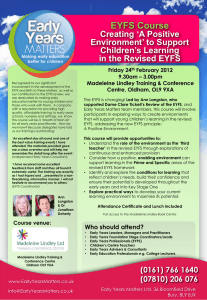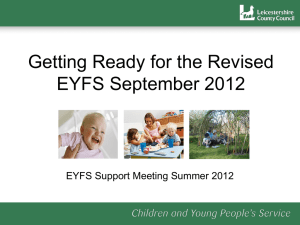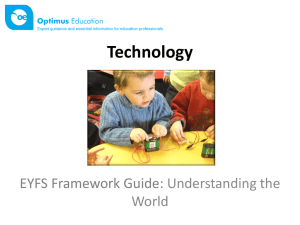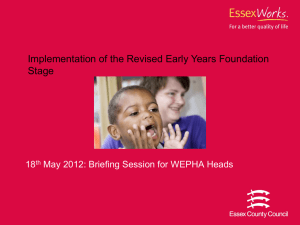File - Early Years Education Department
advertisement
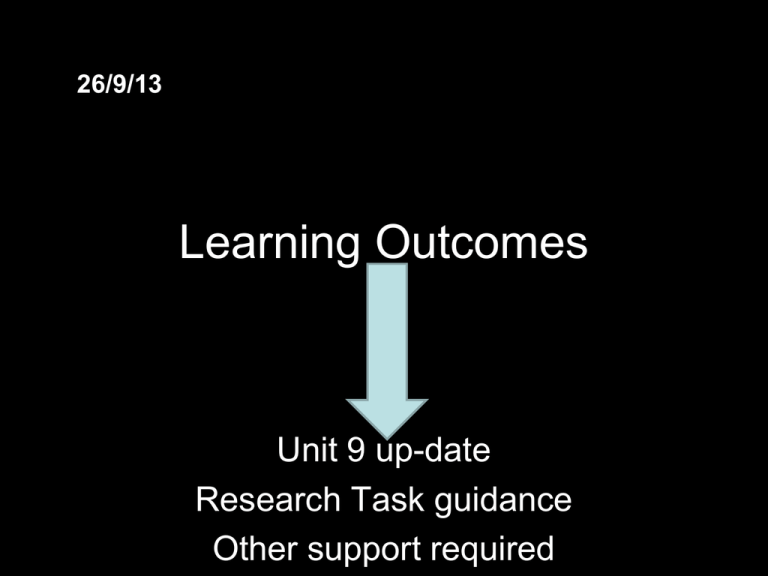
26/9/13 Learning Outcomes Unit 9 up-date Research Task guidance Other support required 26/9/13 Research Task and Diaries Learning Outcomes • To have understanding of requirements of research task • To track diaries to date Thursdays 1-1 diary support Research task planning Any other support Unit 9 • Attendance sheets signed • PER’s at least ½ completed • • • • Diaries completed ???? Bring in next week Permission to observe Record of visits PDP Research Task What is research? ‘It is important to plan to meet the care and learning needs of all children Research Task Print out whole task Identify marks allocated Identify where you might find the information in other units In groups suggest reasons 30 seconds !!!!!!!! why 30 seconds • Why is it important to meet the care and learning needs of all children? Research Task C1 Assess the following 2 examples and the research they used. Can you add to this? Plan C1 Research task • Plan is a key word in the title. Remember that care and learning are of equal importance in the research task and both aspects must be given careful consideration. • The essay should have a beginning, middle and end, rather than a series of nine sections. First C1 Introduce your work with an explanation of why we need to PLAN to meet CARE LEARNING needs C1 WHY PLAN TO MEET CARE AND EDUCATION NEEDS OF ALL CH • Start with revision sheet • Support effective planning • Assessment purposes • Learning styles • SEN • Routine (baby) • Parents partnership • Policies • Legislation • Diversity • Achieve potential • • • • • • • • Brief intro ECM Gibbs Observe KEEP Maslow EYFS My experience Nursery World C1 WHY PLAN TO MEET CARE AND EDUCATION NEEDS OF ALL CH • Rewarding for you, give example • Working with other professionals • Relevant to curriculum • Promote development • ILP • EXTEND LEARNING • Same aims goals • Share with p • To know how to support • KEEP p113 • CAF • plan environment for child INITIATED • ELG 7 C1 introduction • Start with Quote? OR • XXX all agree it is important to plan because • Without planning…… • All professionals……. • KEEP emphasises the importance of…… • As a student practitioner I have learnt about the importance of planning to… C1 5 MARKS • Why plan to meet care and learning needs • Main reasons (use my revision hand out) • Introduce research/theory (little) • Brief examples of practice • Bibliography as you go along!!!!!!!!!! Key words for planning • EYFS discuss how you have planned for 1 area eg self esteem or language and communication or calculations or creative or music • Record keeping early years profile/scales • Planning with children based on obs/parents/other professionals/childs interests/preferences/ colleagues/ • Planning outdoors!!! • Continuous provision resources out all the time Key words for planning • Plan adult-directed activities which are developmentally appropriate based on child's interests. • Consider if the routine provides opportunities for extending play • Key person responsible for learning of child • Adult led means adult asks if child would like to play a game? • Adult led-taking /snack time register unless children put own name in box • Sensitive intervention is appropriate when child initiated activities to become deeper involved Key words for planning • Intervene without changing the play • What will the child gain • Child should have ownership of the play • Modelling play • Coaching help child feel confident to try something • Preparing activities knowing how resources support learning/ involving children? • KUW Problem solving personal Social Emotional • Engaging with children Key words for planning • Engaging with children ..showing genuine interest, enthusiastic facial expressions, • Sustained shared thinking ,,,,talking to a child and helping them think more deeply , explore concepts (ideas) • Language ,,,mathematical language p244 longer fatter outside later fewer helps children express what they are thinking • Open questions • Modelling grammatically correct language 3/11/13 Research Task Complete Q1 Research question 2 starter Do you have 5 reasons with research to back up????? Reflect on how your settings have planned Read the examples Research for planning http://www.nurseryworld.co.uk/article/1188259/two-year-olds-planning--set http://www.nurseryworld.co.uk/article/1106512/guide-revised-eyfs-part4---planning http://www.nurseryworld.co.uk/article/917596/observation-assessmentplanning-eyfs-part-3-planning?HAYILC=RELATED&HAYILC=INLINE M Walker EYFS pages 216-242 But HOW do they meet CARE and LEARNING needs Research In groups identify 5 key factors Analyse back up with your research C2 different approaches to planning which meet care learning needs of all. HOW they meet needs • • • • • • • • • Start with revision notes!!! Long term/Short term Routines Care plans Example from own setting diary task 2/7 state age range Adult led V child led Planning meetings, review Holistic Continuous provision • • • • • • • • • • Planning cycle High scope Reggio EYFS Bowlby Key person Transition Parents needs Use observation Plan with other professionals • And parents Plenary why 30 seconds • Share approaches • Use own experiences of placement Plenary C2 how this approach to planning meets the care needs • Inclusive practice • Planning with children and parents • Child centred balance • Sleep rest • Flexible plans --can change • Challenge • Resilience • • • • • • • NW current research Observation EYFS Bruce Bruner Piaget ELG 7 VYgotsky 9/10/13 • Catch up • diaries 17/10/13 Learning Outcomes C3 Explain in detail the professionals skills needed to plan. Analyse why practitioners need these skills Reflect on your own practice Giving examples Question 3 • Examine in detail the professional skills which practitioners need when planning for children’s, care and learning. Analysis of professional skills required must be about planning. Evidence should be broken down and explored from more than one view to show the importance of the professional skills. Give examples from your setting and from reading of how professional skills contribute to planning Reference to current research or theory can support the analysis. *Be aware of the difference between professional skills and personal qualities to avoid including possible irrelevant material. Question 3 Professional skills when planning Evidence these are needed •10 Key Principles •Multi agency working •Effective communication •Reflective practitioner weakness strengths •Observations •Accountability •Respect •Inclusive •First Aid •Parent Partnership Safeguarding Set up learning environment Applying the best pedagogy Maintain identifying hazards=Health safety Safeguarding Skill how to…for example applied by …. Developed continuing learning CPD Plan and Debate Which professional skills do you feel should be in the top 10? Justify this 10 Key principles? Common Core of Skills and Knowledge? Question 3 Professional skills when planning Evidence these are needed 1.Observation before planning 2.Listening skills 3.Parent partnership 4.PLANNING CHILD INITATED typesbooks 5.Duty of care Key principles 1. Theory EYFS NW example of your placement 2. .ECAT own examples 3. EPPE 4. ECM high scope 5. NATIONAL OCCUPATIONAL STANDARDS Question 3 Professional skills when planning Evidence these are needed 1.Have understanding of how children learn 2.Transitions 3.How to reflect on planning 4.EQUALITY INCLUSION when planning 1. Theorists piaget Bruner Vygotsky tina bruce chris athey 2. Attachment theory NW research 3. EYFS AND Gibbs 4. EYFS KEEP books research Question 3 Professional skills when planning 1.Safeguarding and Multi agency working 2.Age stage development 3.Care needs 4.Behaviour management 5.Risk and challenge 6.Ratios 7.safety Evidence these are needed 1. Legislation 2004 Act Un convention CAF 2. . 3. Maslow 4. .Bandura Freud 5. Research 6. Legislation 7. legislation 1st • Check word count and marks per question 10 or 15? • Do you need to reduce???? 2nd • Have you evaluated or only described? Ensure you back up with a quote!!!! 3rd • Have you related to practice and given examples?? • Have you looked from more than one perspective? Question 3 Professional skills when planning Evidence these are needed 1.Health when planning 2.Encourage social skills when planning 3.Literacy in planning 4.Physical care 5.Planning routines 6.Learning stories for planning 1. ECM 2. ,obesity 3. Research Government statistics 4. 4. 5. 5. 6. p68 carr 2001 Question 3 Professional skills when planning 1.Personalised active learning 2.Learning through play 3.Sustained shared thinking 4.Scaffolding plan for it 5.Transitions 6.Role of resources environment setting up Evidence these are needed 1. DCSF 2008 2. Moyles 2005 howard 2002 3. , 4. Bruner 5. EPPE • • • • • • • • • • Personal development IEP ECM Principles for working with children Recent initiatives Penn Green Effective communication Confidential KEEP Positive images DCSF 24/10/13 C4 Learning Outcomes C4 Analyse how effective planning supports practitioners in meeting children’s care and learning needs Starter Feedback on what makes effective planning In 2 groups think of an activity which went well and one that did not go well Discuss make notes list the key factors Question 4 • EYFS stresses importance of planning, it states ‘xxxxx’ this I feel is essential because children have individual needs such as |XXXX and if these are not met the result would be xxxxxx and example of how this is effective in my placement is when xxxxx As I have previously stated Maslow believed that children need XXXXX which can only be achieved by planning xxxx for example xx Q4 • Know what your aim is • Know ELG NC • Inclusion • Engagement • Diversity • Differentiation • All children achieve aspirational grade • Safeguarding • Diet allergies • All team working together • Care routine • Holistically • Resources enough appropriate • Learning through everyday opportunities • Flexible • Adult led child led • Characteristics of learning • Promote development of babies (research shows) everything the baby experiences the brain makes connections • Safe environment • Routines • Planning play based activities • Planning for independent resilient learners •Who says •Why • Eleanor Goldschmied • Planning enough time • Planning for debates • Open ended questions • Forming positive relationships • Meeting curriculum outcomes • Planning with team • Parents • Other professionals • Transitions •Who says •Why • winnicott • DCSF 2012 statutory framework assessments should be based on observations • Children planning what they want • Flexible planning, if raining go outdoors • Reflecting on our planning • Planning behaviour rules • policy •Who says •Why Link pedagogies/influences • • • • • • • • Montessori Steiner Isaacs Reggio Planning cycle anti-bias Different planning Structured unstructured Outdoors Suggest which reflective diaries would support this criteria ? Identify number of areas of learning Link activity to learning outcomes Relate to curriculum and principles L4) Discuss how to reflect on own practice L5) reflect on an experience with a recommendation L6) Evaluate 2 reflective diaries Remember the Learning Outcomes Q4 • WHY DO WE NEED TO PLAN EFFECTIVELY • Who says • Explain what they mean • Link to practice to prove this • Discuss different types of planning • • • • • Nursery world article theorists Principles for EYFS KEEP Common core of skills and knowledge for children and young peoples workforce CWDC • Books on shelf Q4 planning • Managing the learning environment WHY • WORKING IN PARTNERSHIP why • Plan to include learning styles • Observation skills • Plan for types of play • Professional skills are needed for effective planning Question 3 Professional skills when planning Evidence these are needed 1.Working in partnership 2.Planning for creativity 3.Heuristic play 1. Desforges and abouchaar 2003 2. E goldschmied Question 3 Professional skills when planning Evidence these are needed 1.Working in partnership 2.Planning for creativity 3.Heuristic play 1. Desforges and abouchaar 2003 2. E goldschmied 7/11/13 Learning Outcomes C5 planning an enabling environment In groups suggest reasons 30 seconds !!!!!!!! why 30 seconds • Why is it important to plan an enabling environment which meets the needs of all the children's care and learning needs? Research Task C1 Assess the following 2 examples and the research used. Did they give reasons? How, where, when, why, what Question 5 WHY Development Security Self esteem Confidence Resilience Safeguarding Indoors Outdoors Routine Key person WHAT IT PROVIDES • Forest • EYFS • Montessori • ECM • INCLUSION • INDEPENDENT LEARNERS • HIGH SCOPE • TRANSITIONS Question 5 WHY AREAS of development Creative / physical ect Visits outside to..places Natural environments Man made..shops Mixing own paints Child initiates Preparing children for later WHAT IT PROVIDES • EYFS enabling environments • Policies EYFS • Stimulating • Motivating • Inclusive • Baby area • Attachment • Feel part of group with displays of family Question 5 WHY Place to socialise Nurture room research this Resources Smith 1997 Size space Open ended activities Co-operation encouraged# Problem solving Communication skills Games taking turns WHAT IT PROVIDES • Real toys phones hole punctures • Role play • Observe how child uses resources • Aware of world around them • Respect it • Value it • Positive images Question 5 WHY Art to express Circle time express feelings talk about differences Bruner language acquisition Vygotsky social Literacy Neuman 1997 literacy Wolf and heath 1992 learning literacy through play WHAT IT PROVIDES • Play is the foundation for literacy and language • Maths • Learn at home also • Toddlers counting singing • Stimulates questions • Role play • SCHROEDER 1991 health and well being outdoor environment Question 5 WHY Planning !!!!!!!!!!unique child Interests ICT Physical growth ALMOND 2000 BAILEY 1999 DOHERTY importance of stimulating environment p 179 Baby brain growth Obesity research WHAT IT PROVIDES • Different cultures environment reflected Levine 1996 • Learn about safety cliffs roads • Poverty • Age stage environment • Supporting better outcomes • Child centred curriculum Question 5 WHY Disability SEN Warm welcoming Babies sensory room P216 CYPW --Open door policy Multi agency working WHAT IT PROVIDES • Reflective practice • Place to rest eat talk • Celebrates all religions • Challenging outdoor • Promotes learning • Variety • Active Piaget • Common core (skills we should have) Research enabling environment Reggio Key ideas Own examples Pedagogies 14/11/13 catch up • • • • • • • • C1 C2 C3 C4 Sarah to add C5 C6 Sarah’s unit C7 Unit 7 C8 Unit 7 Analyse When planning the practitioner must have an understanding of inclusive practice as it states in the EYFS ‘ ‘ this means when planning we must…… however if the practitioner does not…….. then this will not identify and meet individual needs such as …… XXX also supports this view as he states,,,,,, I agree that……..practitioners can plan but to is it effective does it meet the care /learning needs by,,,, it will meet…..In Question 78 • Analyse the evidence of the role of play in children’s learning. • (This is an extension of criterion 4) • 10 marks Question 78 • • • • • • • • Learners should consider their research and explain in detail how important play is in children’s learning. Consider some relevant ideas from philosophical approaches, international perspectives and practical experience, about how play supports children’s learning. Examples can show links to practice. Use knowledge gained from theory, research and current initiatives in references to support the analysis. Question 78 • Include current thinking and research relevant to play, learning and education • and also refer to traditional philosophical approaches; • Discuss how different theoretical approaches to play, learning and education are currently applied in practice in settings. . • Show in detail how children’s identified learning needs can be met when settings use these different approaches. • Give examples of best practice and include references to show the influence of relevant theorists and research. Theorists • Freud childhood most critical phase of development he emphasised play activities useful for revealing inner feelings. • Susan Isaacs focused on what the child could do and …. • Elinor Goldschmied Theorists • Robert Myers (1992) various child rearing practices • Froebel • John Matthews 1994 (babies not born empty vessels) • Tina Bruce • Trevarthen 1980 (babies can synchronise their rhythmical patterns with carer) sounds/baby talk Theorists • Martin Hughes 1986 role of the adult working with young children is to help them build the links from concrete experiences to abstract thinking • Siraj-Blatchford children whose first language is not English (need sensory materials that stimulate their senses) • David Elkind Lilian Katz believe early formal instruction harms young children • Peter Moss 1994 Role of play • • • • • • • What is play Types of play Theories of play Philosophical approaches to play Authors on play Own experiences on play International approaches on play Philosophical approaches • • • • • Reggio Emilia High scope Montessori Rudolph Steiner Sweden http://www.ncac.gov.au/pcf/case_studies_philo_ approachesJune2010.pdf • Adult led V child led • My opinion……..children’s needs are being met by….. • Play is important because when planning……… Importance of play • Look at latest theory • Look at recent research • Nursery worlds Starter 10mns 1. Read scenario Key words 2. Plan an • Physical activity/experience • Social 3. Link to theory/theorist or • emotional philosophical approach • Language 4. Link to Curriculum area • Cognitive 25/11/12 Question 4 • Analyse how effective planning supports the EYP in meeting care and learning needs • How does brilliant planning help you to meet children's care and learning needs Q4 • Know what your aim is • Know ELG NC • Inclusion • Diversity • Differentiation • All children achieve aspirational grade • Safeguarding • Transitions • Diet allergies • All team working together • Care routine • Holistically • Resources enough appropriate • Learning through everyday opportunities • Flexible • Adult led child led Question 7 8 • Include current thinking and research relevant to play, learning and education and also refer to traditional philosophical approaches; • Discuss how different theoretical approaches to play, learning and education are currently applied in practice in settings. • Show in detail how children’s identified learning needs can be met when settings use these different approaches. • Give examples of best practice and include references to show the influence of relevant theorists and research. 24/11/11 Question 4 • EYFS stresses importance of planning, it states ‘xxxxx’ this I feel is essential because children have individual needs such as |XXXX and if these are not met the result would be xxxxxx and example of how this is effective in my placement is when xxxxx As I have previously stated Maslow believed that children need XXXXX which can only be achieved by planning xxxx for example xx • Promote development of babies (research shows) everything the baby experiences the brain makes connections • Safe environment • Routines • Planning play based activities • Planning for independent resilient learners •Who says •Why • Eleanor Goldschmied • Planning enough time • Planning for debates • Open ended questions • Forming positive relationships • Meeting curriculum outcomes • Planning with team • Parents • Other professionals • Transitions •Who says •Why • winnicott • DCSF 2012 statutory framework assessments should be based on observations • Children planning what they want • Flexible planning, if raining go outdoors • Reflecting on our planning • Planning behaviour rules • policy •Who says •Why Question 78 play • • • • • • • • Current thinking ….. play and learning Theories …… Research new EYFS Principles (soon more emphasis on active learning changes) ECM? Current initiatives Meet children's identified learning needs Link to practice Influences on today • • • • • • • • Montessori Steiner Isaacs Reggio Planning cycle anti-bias Different planning Structured unstructured Outdoors Q4 • WHY DO WE NEED TO PLAN EFFECTIVELY • Who says • Explain what they mean • Link to practice to prove this • Discuss different types of planning • • • • • Nursery world article theorists Principles for EYFS KEEP Common core of skills and knowledge for children and young peoples workforce CWDC • Books on shelf Q4 planning • Managing the learning environment WHY • WORKING IN PARTNERSHIP why • Plan to include learning styles • Observation skills • Plan for types of play • Professional skills are needed for effective planning • Remember skinner positive reinforcement in planning children age plan the rules 7/11/11 • Theories resouces discuss from mor than 1 perspective in groups • A theory • A philosophy • Where could you put importance of music? • Self care CRB • Hand out statements in CLC key statements which they have to guesse where to put Research task C8 Finally, learners should analyse the importance of play and make a conclusion which evaluates why planning is important to meet the care and learning needs of all children. Second C2 C3 C4 C5 C6 C7task • Give an explanation of a range of approaches to planning, of the professional skills required to put planning into practice and to show an understanding of ways in which different theoretical or philosophical models and current frameworks influence planning. Also discussion of why it is important to plan an enabling environment should be included. • Learners need to demonstrate their understanding of evidence to explain the importance of an environment that meets children’s care needs and enables them to learn. • Evidence should refer to philosophies and current initiatives which justify the main reasons for establishing an enabling environment. Include discussion of reasons such as how the indoor and outdoor environment can support and promote development and learning ways enabling environments can extend children’s learning and development the value of exploration and challenge the consideration of relevant aspects of safety • Examples of best practice and reference to theories and research can demonstrate understanding of evidence. 8/11/11 Research task exam Examine a theory or philosophy and compare looking a the similarities or differences No La La web sites Include pioneers Government initiatives Legislation Theory Philosophies 1st • Check word count and marks per question 10 or 15? • Do you need to reduce???? 2nd • Have you evaluated or only described? Ensure you back up with a quote!!!! 3rd • Have you related to practice and given examples?? • Have you looked from more than one perspective? Look from more than one perspective • • • • • Piaget V Freud Piaget V Bruner Vygotsky =Bruner Robert Owen = EYFS Froebel Question 78 play • Philisophical approaches • seen as strong educational alternatives to traditional education and as sources of inspiration for progressive • Waldorf, Montessori, and Reggio Emilia • http://en.wikipedia.org/wiki/Reggio_Emilia_appro ach • http://ecrp.uiuc.edu/v4n1/edwards.html 30 seconds !!!!!!!! why 30 seconds • Why is it important to meet the care and learning needs of all children? Question 78 play • • • • • • • • High scope ECAT Child centred Self chosen Sweden Schemas C Athey Observations outdoor play Question 78 play • • • • • • • Piaget vygotsky Bruner T Bruce Mortimore 1998 Sure start Regiio Forest schools EYFS EPPE Karl Groos p105 UN convention rights to play C7 Theories • Analyse how child development theories support planning for learning and play. • Describe 2 theories • 1 philosophical approach, • EYFS quote to prove importance of planning and children learning • Benefits of knowing using these theories/approaches/frameworks when planning
